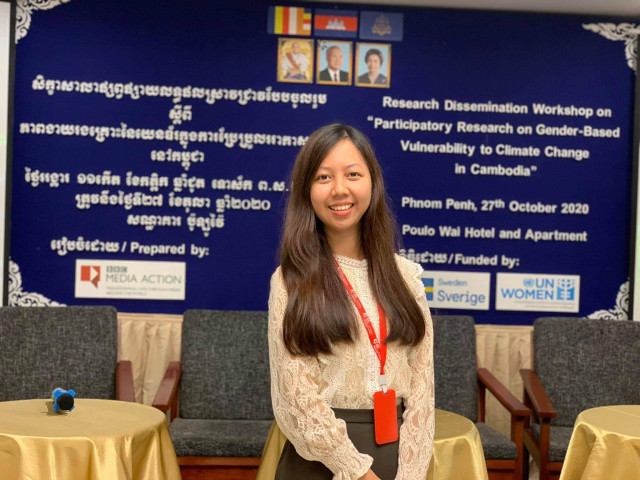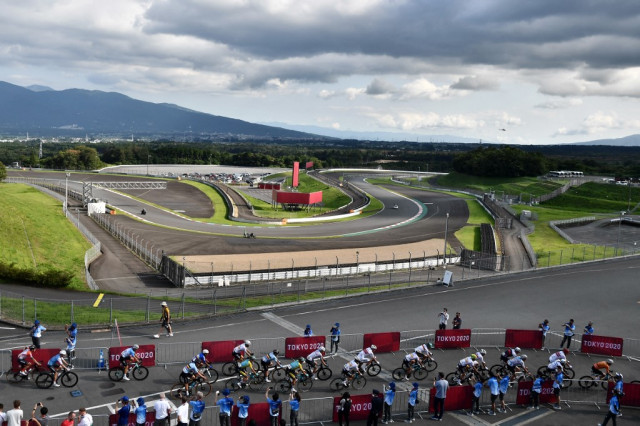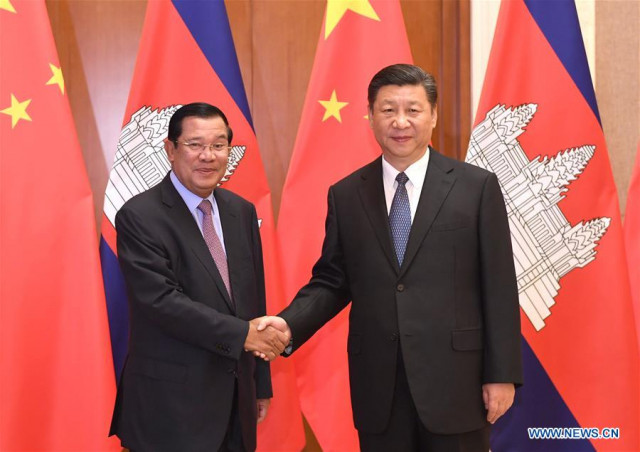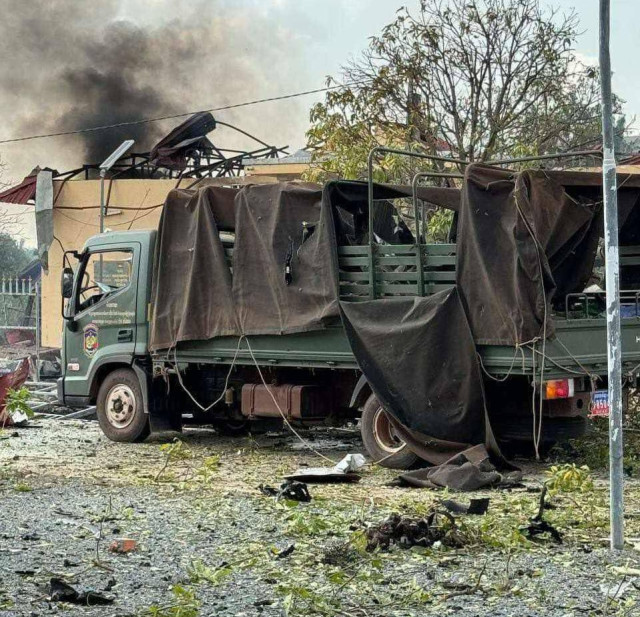Global Warming: the Need to Take the Information to Cambodians Affected

- Sao Phal Niseiy
- March 28, 2021 9:21 AM
Rural populations and especially women should be informed and taught practical ways to address those issues impacting their lives, a researcher says
Kim Lysivning currently is a research officer at BBC Media Action—the British Broadcasting Corporation (BBC) international-development charity organization—and has been involved in climate research for three years. She shared her thoughts with Sao Phal Niseiy of Cambodianess.com on what has driven her interest in climate change and also her perspective on Cambodia’s current capacity to deal with environmental change.
Sao Phal Niseiy: First, what has driven your interest in climate change research?
Kim Lysivning: Research has always been my passion. And I perceive this as important since, not only I am able to meet participants in wide range to gain vast experience from different individuals and learn from them, but also I get to utilize research findings generated to produce sound recommendations for better course of actions.
My work at BBC Media Action has meant I have been involved in several pieces of research on climate change, for example our Climate Asia study on how Cambodians are living with climate change and the research project on gender-based vulnerability to climate change.
Climate change research is important because climate change is a global issue and everyone is unavoidably affected. Likewise, Cambodia is also highly vulnerable to the impacts of change in climate as livelihoods of 79 percent of the rural population such as agriculture, forestry and fisheries are primarily dependent on natural resources. However, capacity of rural people to employ adaptation strategies to extreme weathers is still limited. Therefore, research is essential in constructing evidence-based insights to be taken up, aiming to address the issue of climate change.
I am also particularly interested in the gender aspects because our research has shown that women and men are impacted differently, and I would like to continue to study these generated fruitful insights to help vulnerable groups impacted by climate change, particularly women, in adapting to changes through project activities in accordance to results from research conducted.
Sao Phal Niseiy: Tell us about the challenges you have been dealing with when it comes to being a researcher. How have you managed to cope with them?
Kim Lysivning: There is variety of challenges as a researcher. Yet, this has provided me knowledge, lessons learnt as well as experiences and made me become who I am today. First of all, one of the research challenges for me is data analysis. Yet, I have learned a lot of tools to help manage this such as different frameworks to categorize vast amount of data and how to look at patterns/trends to be developed into themes. Second of all, it is quite challenging to recruit target participants as often they are either very busy or not willing to participate. It can also be difficult to find people from vulnerable groups. It is therefore important to find the suitable time and to explain clear purposes to the study participants. It is also helpful to get assistance from network partners or local facilitators such as village chiefs and respected elders in society. Last but not least, it can sometimes be personally challenging when doing fieldwork. One of the experiences I will never forget is staying with local villagers where drought hits hard and water is extremely scarce to understand the impacts on them. I have adapted and saved water the way community members did to better understand the way they lived.
Sao Phal Niseiy: From your very own perspective, why this such project matters for the Cambodian society?
Kim Lysivning: Most research projects focus on a top-down approach. Yet, this participatory study has utilized the bottom-up approach to get first-hand experiences of local community members and to understand impacts and coping strategies they have encountered and employed. This is a methodology that can be replicated in other studies as well, which proves to be useful for many areas.
Climate change is an important issue for Cambodia, and women and men experience the impacts differently. It is therefore significant to investigate the root causes of gender-based vulnerability to climate change so that these can be used to inform future action. For example, we found that women face structural, social and resource barriers. Therefore, recommendations around those barriers have been produced for different stakeholder levels through publication and dissemination workshop to be implemented in their future activities/projects.
Sao Phal Niseiy: Throughout your work and engagement in climate research projects that aim to promote awareness and comprehension of the climate crisis, what is the one thing you have learned and wanted to highlight?
Kim Lysivning: One thing I have learned is that, despite the fact a lot of work has been done to raise awareness and build understanding of climate change and adaptation strategies, there are still some gaps in knowledge and actions of rural/remote populations who are highly impacted by changes in climate. Therefore, more efforts and cooperation from all relevant stakeholders would be helpful to help raise knowledge and practice of actions that can be taken at large scale.
Sao Phal Niseiy: Cambodia is one of the most vulnerable countries to climate change and people are increasingly affected by the extreme weather events as well as other climate-related disasters. It is critical that Cambodians have sufficient knowledge of the change in climate and be more prepared to take action. To you, are you optimistic about emboldening a change in people’s behavior and response to this crisis?
Kim Lysivning: I am optimistic that change in people’s behaviors and response to climate change will result, as long as efforts from related stakeholders in the work still continue. Also, people take action on the grounds in what is important to them and things that matter to their lives. Hence, changes in climate bring about impacts on livelihoods and their loved ones, which can act as motivators to changing behaviors: They then can become agents of change.
Sao Phal Niseiy: As a woman researcher, do you think we all have done enough so far in terms of climate action and adaptation—particularly getting women involved in approaches to tackle the climate crisis?
Kim Lysivning: The more people who can get involved in determining approaches to tackling the climate crisis, the better. One of the things we found in the participatory research study on gender-based vulnerability to climate change was that social and cultural norms can stop women getting involved in meetings and learning new information and skills and how to access relevant support. This is because they have responsibility for household chores and children, and often women are not able to challenge their husbands’ decisions. This can stop them getting involved in discussions and decisions around climate change. Currently, both strategies and implementation from the government and CSO [civil society organization] have been put into implementation. Therefore, further efforts in tackling those norms would be a significant factor in empowering women to deal with climate hazards.
Sao Phal Niseiy: In terms of climate action, what do you want to see happen in the future?
Kim Lysivning: In the future, I wish to see all Cambodian people have knowledge regarding climate change, its impacts and the ability to employ various strategies to respond to impacts of extreme weathers. I would like to see media and communication strategies used in more ways to support this, such as showing stories of change of real individuals facing climate issues and overcoming the problems through simple, low-cost and effective solutions to climate-related issues. Our research has found that people are inspired and driven to take the same actions by discovering contents relatable to their lives. So, it is vital to ensure that communication materials reach everyone, including those without access to media

















